Evidence-Based Standards for
Breastfeeding Programs
The following are key evidence-based standards for developing a comprehensive breastfeeding program. Review each tab for explanations and resources to guide you through the process.
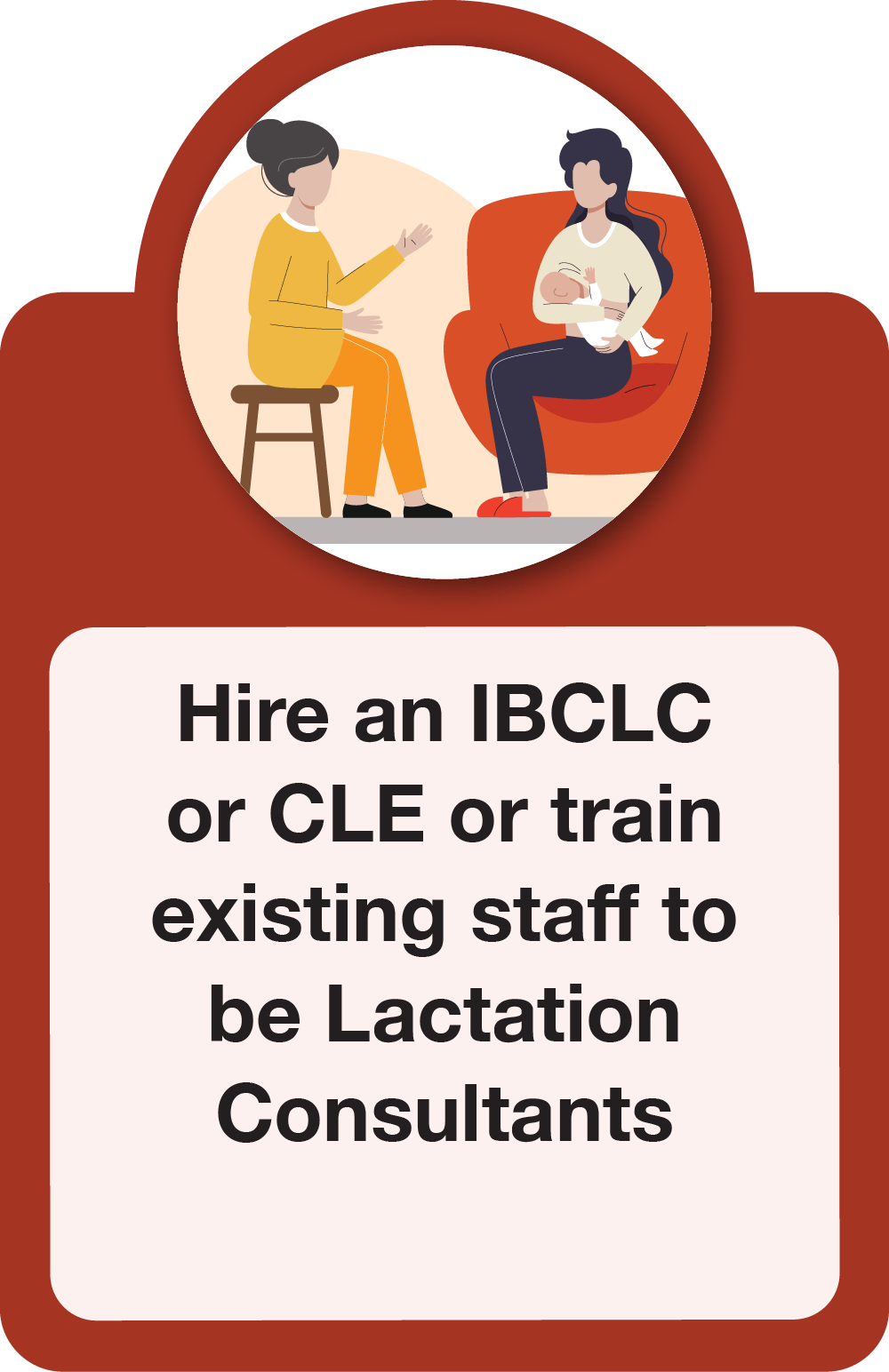
Hiring an IBCLC or training existing staff to become an IBCLC
One of the most important steps in creating a comprehensive breastfeeding program is to hire or train staff to become a Lactation Consultant or IBCLC (International Board of Lactation Consultant Examiners®). IBCLC’s are breastfeeding experts that can work hand in hand with your patient population and can help you work through the other steps in creating your program. They are the cornerstone on which your program will be built and will be the guiding light in all things breastfeeding.
Hiring an IBCLC or Lactation Consultant
Hiring an IBCLC or Lactation Consultant will be the quickest and easiest way to start your program. If hiring an IBCLC, feel free to use the following Lactation Consultant job description to post on your chosen job search site.
Training an Existing Employee to Become an IBCLC
Training an existing employee to become an IBCLC or Lactation Consultant can also be a great strategy; however there are many details and steps, and this may take some significant time. Below are a few resources to help with that. All resources for this process can be found at ibclc.org. Your candidate should read this guide thoroughly: Candidate Information Guide.
Health Science Courses
If your candidate is not a licensed health care provider, they are required to complete several health sciences courses to sit for the IBCLC exam. Your candidate should check this resource to make sure they have all required courses: Health Sciences Education Guide.
-
If missing any courses, your candidate can use an online course to complete this requirement. Here is one example: Marie Biancuzzo’s Health Sciences Continuing Education Package
-
In addition, Basic Life Support would need to be completed locally.
Choosing a Pathway
There are three pathways to becoming an IBCLC or Lactation Consultant. Your candidate would need to choose which pathway fits best:
Minimum of 95 Hours of Lactation Specific Education
For all pathways, your candidate will need a minimum of 95 hours of lactation specific education within the five years immediately prior to examination application. There are many options available for these education hours. Your candidate can take multiple trainings and participate in webinars and conferences and those hours will count if the training is offering L-CERPs (Lactation Continuing Education Recognition Points). L-CERPs deal specifically with topics about human lactation and breastfeeding.
Below is one example of a comprehensive self-paced training that offers all required 95 hours. Your candidate can take this course to satisfy the 95 hours of lactation specific education requirement:
-
Marie Biancuzzo’s 95-hour Lactation Education Course
(This course includes the required five (5) hours of communication skills.) -
North Carolina State University, Lactation Education
(LEAARC Approved)
Lactation Specific Clinical Practice Hours
Depending on which pathway the candidate has chosen, they will have to complete a certain amount of lactation specific clinical practice hours. Clinical practice hours can be obtained in an appropriate supervised setting, which would include the following:
- Hospital
- Birth Center
- Community Clinic
- Lactation Care Clinic/Practice
- Primary Care Practitioner’s Practice/Office
Candidates can refer back to the Candidate Information Guide for more information.
IBCLC Exam
After completing all requirements for the chosen pathway, your candidate must sit for the IBCLC Exam. It is currently offered only two times per year, in March and/or April (English) and in September (in all IBLCE languages). To sit for this exam, your candidate must complete the application 3-6 months in advance. For instance, to apply for the March exam, the application period is October-December, and for the September exam, the application period is May-June. For exact dates, please visit: Certification Fees and Key Dates section of ibclc.org.
Once all requirements are met, your candidate can apply to take the exam here: Apply for the IBCLC Exam & Exam FAQs section of ibclc.org.
Training an Existing Employee to Become a Certified Lactation Educator (CLE)
IBCLCs are the breastfeeding experts. CLEs (Certified Lactation Educators) are qualified to teach families about preparing for their infant, how lactation works physiologically, common challenges to expect, and other general lactation support. CLEs educate and to help direct patients to an IBCLC when more help is needed. They are not certified to assess breastfeeding concerns and needs. Your staff can be trained to become a CLE at your nearest Area Health Education Center like Northwest AHEC or various other online sources.
Referring to an IBCLC or Lactation Consultant
If you cannot hire an IBCLC or train existing staff to become an IBCLC, you can refer your patients to a local IBCLC. Consult this resource, North Carolina Breastfeeding Resources by County, to create a referral list convenient to your area and share with all of your clinic staff.
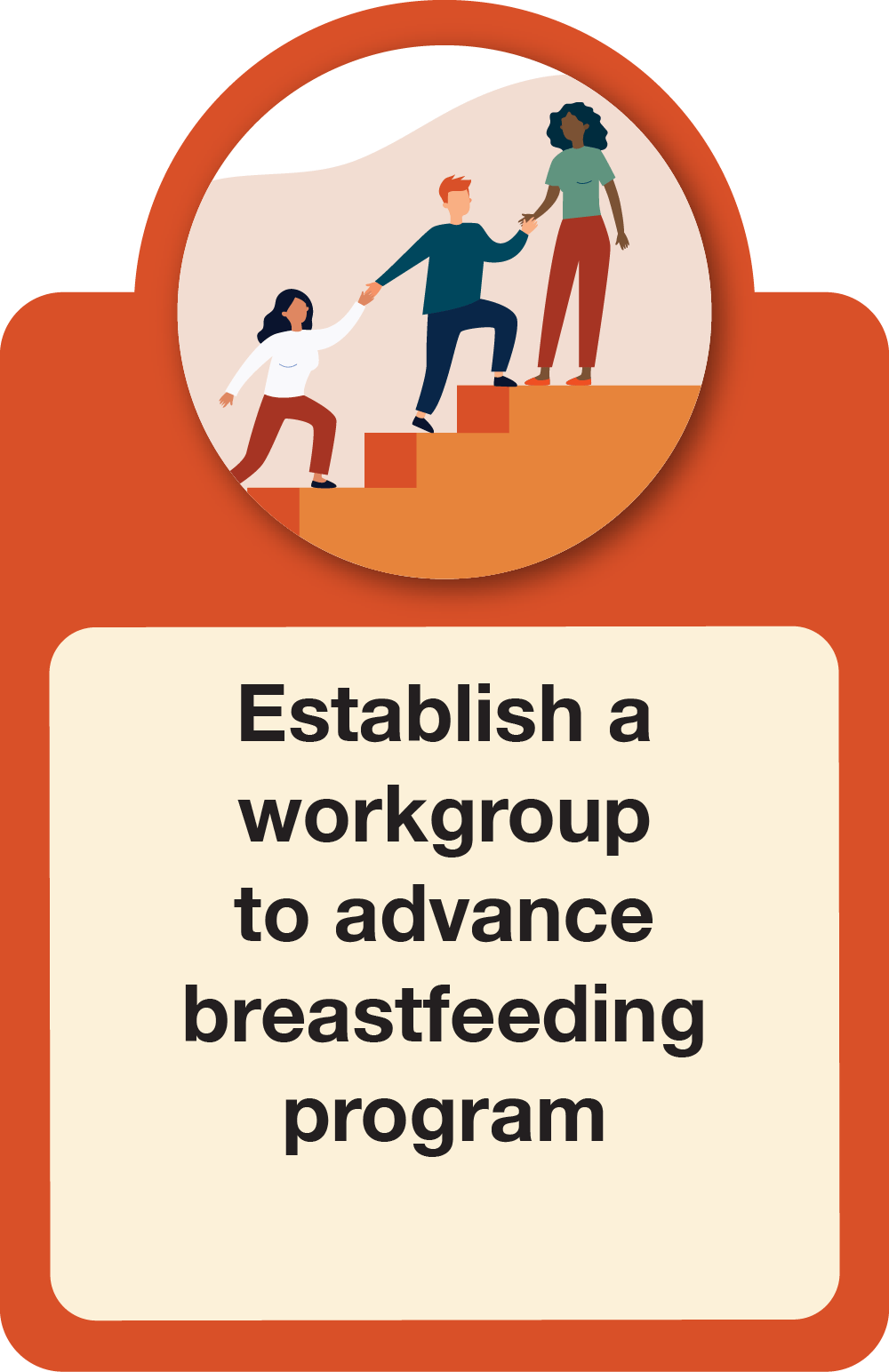
Convene a Breastfeeding Workgroup
Convene all staff members that are important to advancing your breastfeeding program. This could include the breastfeeding director, coordinators, IBCLC or IBCLC students, and clinic champions. You should have at least one provider on this team. Meeting monthly will help to facilitate the development and implementation of breastfeeding support projects.
Your workgroup can assess where your clinic is with this Pre-Application Assessment: NCBC Family Friendly Clinic Award – updated July 2023 (alchemer.com).
Once the assessment is complete, your team can easily work through areas that do not meet the standards.
If desired, you can apply for the NCBC Family Friendly Clinic Award. This is a prestigious award that shows your patients you are committed to breastfeeding and have a comprehensive program. More information about the award can be found here.

Develop a Written Breastfeeding Policy
Having a written breastfeeding policy is an extremely important step in this process. This allows for everyone in the clinic to know and understand the expectations. This also ensures that over time that all your hard work to develop a breastfeeding program will be sustained.
Here are a few breastfeeding policy examples:
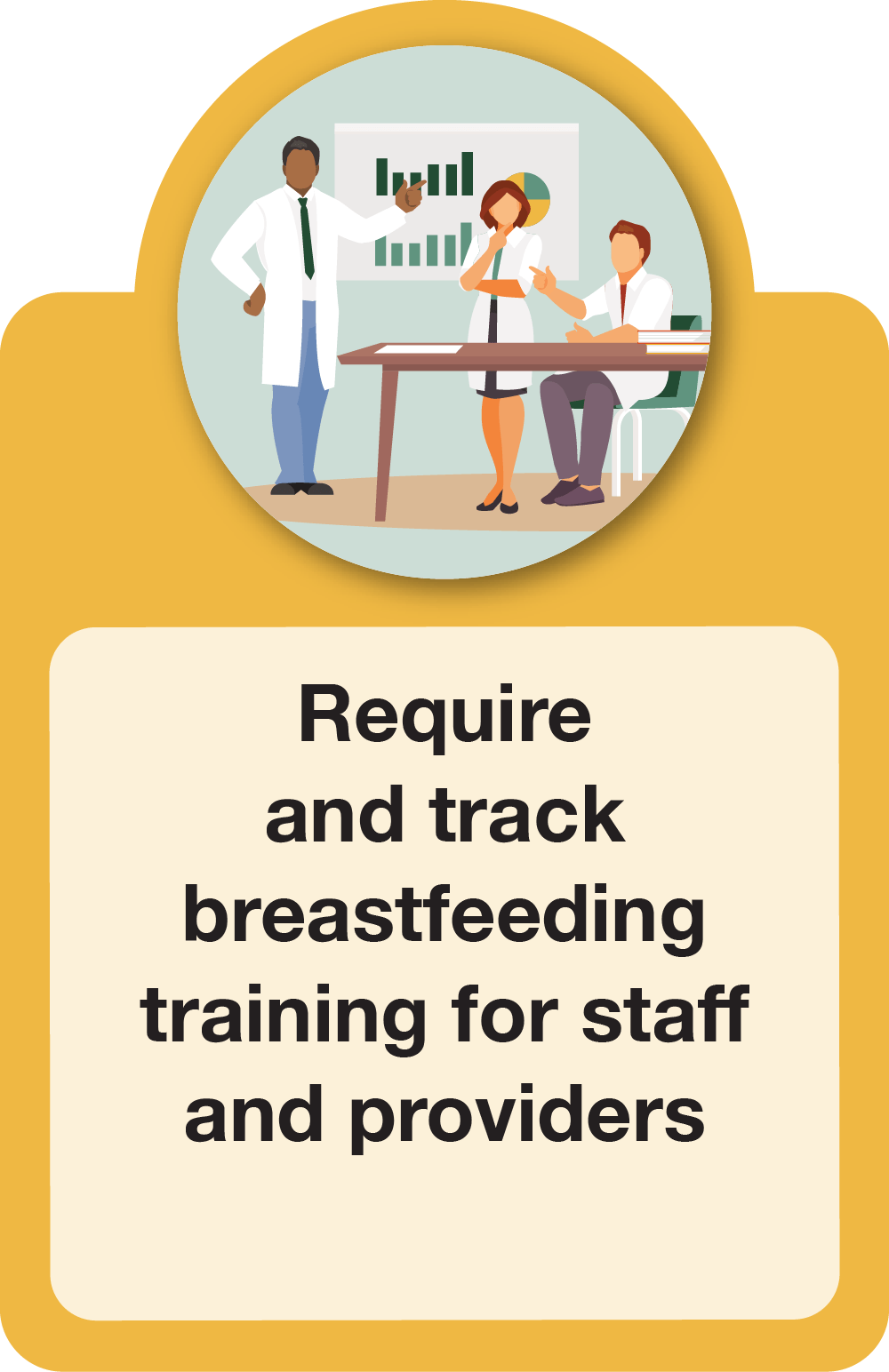
Require and Track Breastfeeding Training for Staff and Providers
Training is important, particularly in the area of breastfeeding. Standards change and it is vital to keep your staff and provider’s knowledge up to date. The recommendations for lactation trainings are as follows:
- Providers: at least 3 hours of lactation training per year
- Staff: at least 1 hour of lactation training per year
To truly have a comprehensive breastfeeding program, all staff from the CEO to the janitor should be supportive of breastfeeding. To receive the NCBC Family Friendly Clinic Award, your clinic will need to have completed the recommended training hours for at least 80% of all clinic staff and providers.
Many clinics use a learning management system, LMS, to assign and track training. Many of those systems have breastfeeding training built into their catalog already. Your Human Resources department should be able to assign these trainings easily.
If your system does not have lactation training, your Human Resources department can upload the following modules and assign as needed.
Feel free to download a copy of this resource to track trainings that are not through your clinic’s LMS.
More Online Courses/Trainings for Providers and Staff
-
The B.L.A.C.K. Course The B.L.A.C.K Course is facilitating our 45 Hour Lactation Course for aspiring Black lactation professionals and Non-Black Allies supporting Black Communities. The Course will be taught virtually. Provides the student with a basic knowledge in:
- Anatomy
- Physiology
- Biochemistry
- Communication/Counseling
-
Bella Breastfeeding Provider Training. (Register/Create account first, then course library page will appear. Search for Bella or Breastfeeding to locate the modules. CMEs for a fee)
-
Breastfeeding University (Six free 0.5-hour segments. CMEs available for small fee upon request)
-
HealthConnect One collaborates with communities across the country to develop culturally-reflective peer-to-peer support programs and initiatives that promote pregnancy, birth, breastfeeding, and early parenting
-
Carolina Global Breastfeeding Institute has many programs including training for lactation consultants.
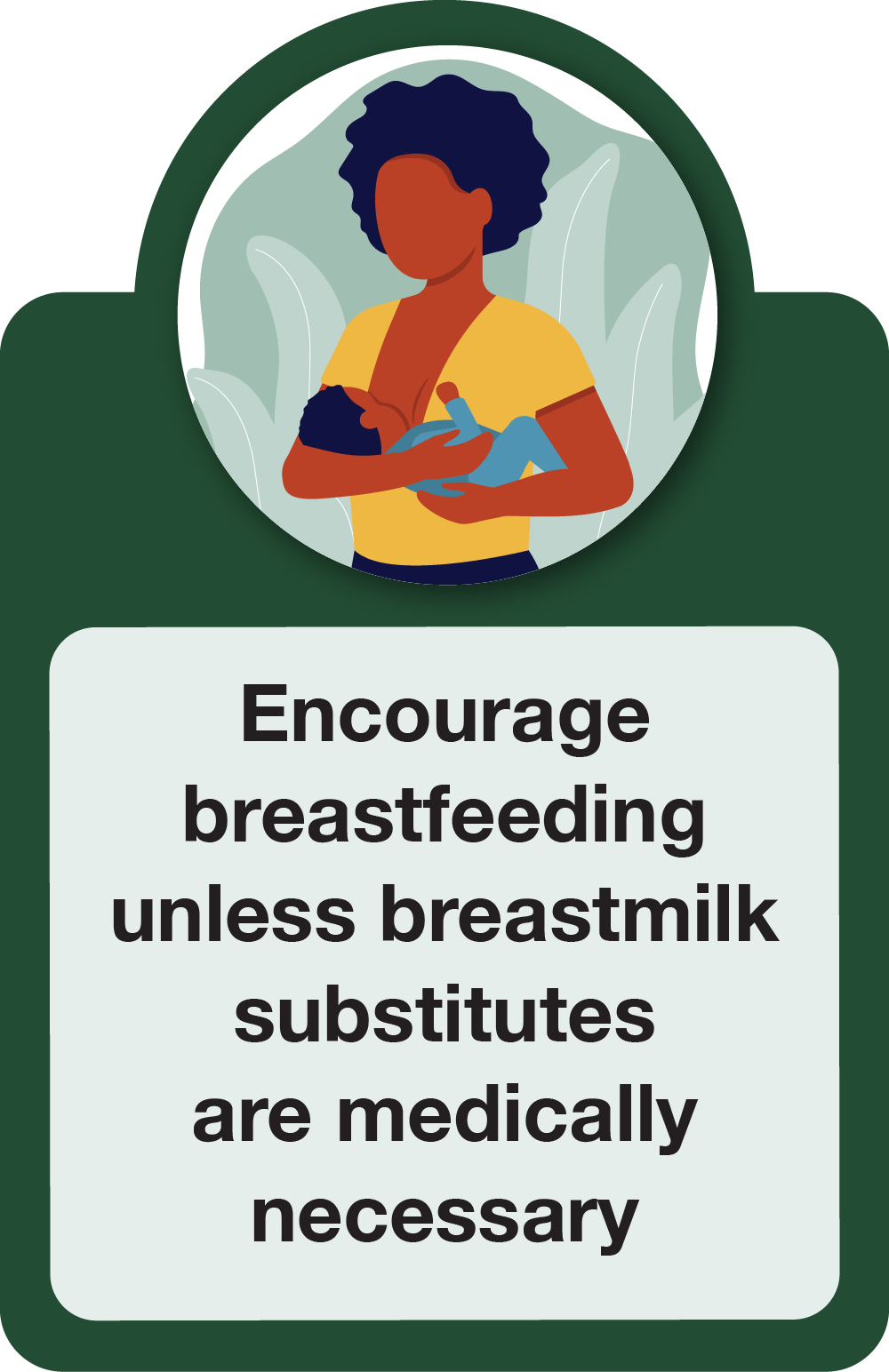
Encourage Breastfeeding Unless Breastmilk Substitutes are Medically Necessary
Not only does breastfeeding provide both short term and long term health benefits for babies, but it also provides long term health benefits for the breastfeeding mother as well. For that reason, we recommend encouraging breastfeeding unless there is a medical need for breastmilk substitutes.
For those rare occasions, many clinics have breastmilk substitutes on site to offer to patients as medical needs arise. This is an acceptable practice, if the formula is purchased at market value.
Some breast milk substitute companies send clinics formula samples. We recommend clinics donate these samples to a local pantry and to refer patients to that pantry if the need arises.
Studies have found that accepting and handing out free formula samples has a negative impact on breastfeeding rates. Here are a few resources to review on this topic:
- Fact Sheet: Infant Formula Marketing in Doctors’ Offices and Health Clinics
- WHO reveals shocking extent of exploitative formula milk marketing
- It’s time to stop infant formula marketing practices that endanger our children
- Marketing Infant Formula Through Hospitals: the Impact of Commercial Hospital Discharge Packs on Breastfeeding
- How the Marketing of Formula Milk Influences Our Decision on Infant Feeding
- ABM Executive Committee urges AAP to discontinue formula marketing relationship
- The High Costs of “Free” Drug Samples
- ABM Clinical Protocol #14: Breastfeeding-Friendly Physician’s Office: Optimizing Care for Infants and Children, Revised 2013
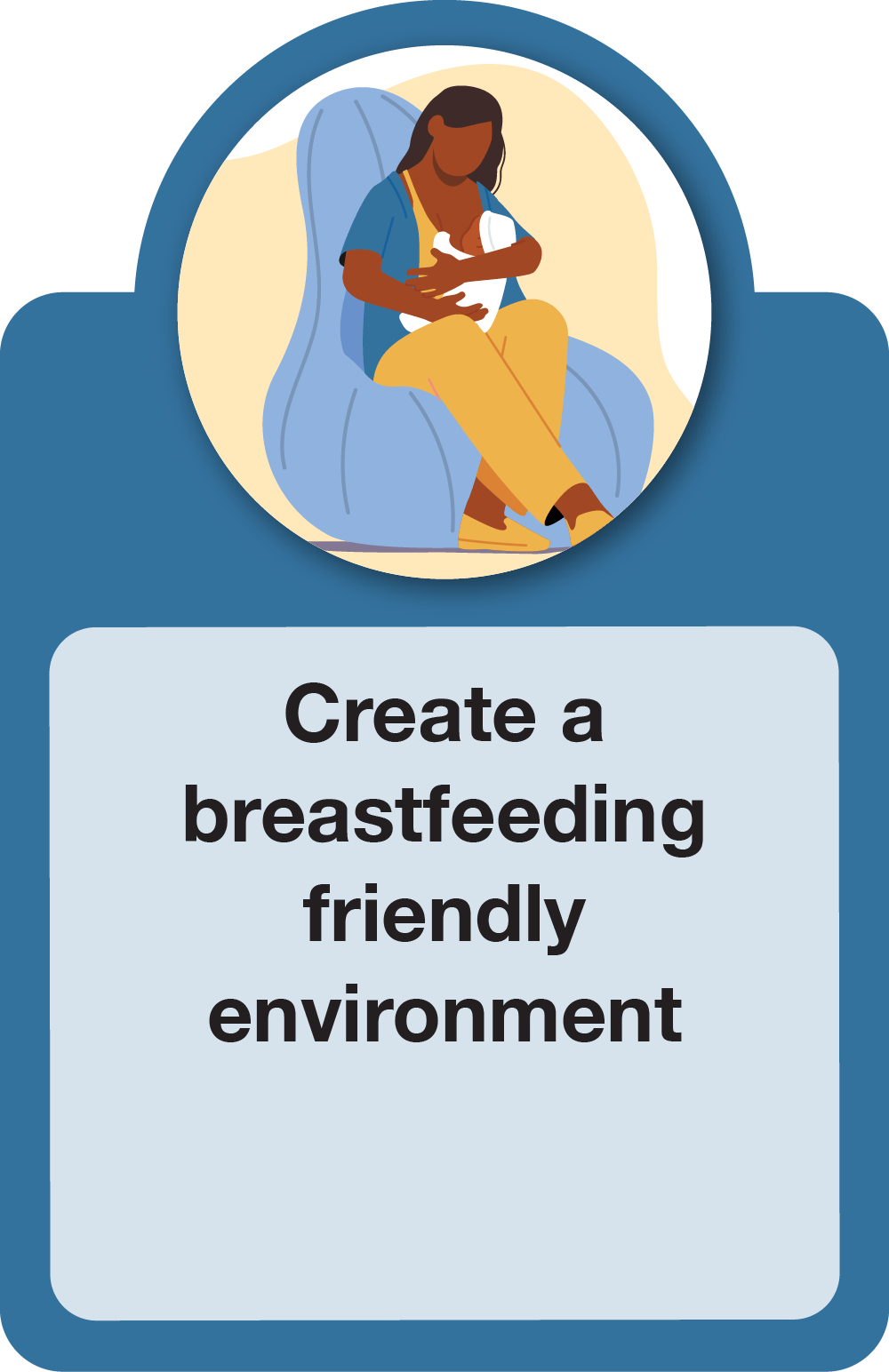
Create a Breastfeeding Friendly Environment
A comprehensive breastfeeding program will include elements of a breastfeeding friendly environment. These elements might include the following:
- Pictures of women breastfeeding their infants
-
Signs that welcome breastfeeding anywhere in the clinic but offer a private space upon request
Other elements of a breastfeeding friendly environment would include a private space, not in a bathroom, where patients and staff can go to breastfeed or pump. This space should be comfortable, convenient, and private, and have clear access to an electrical outlet.
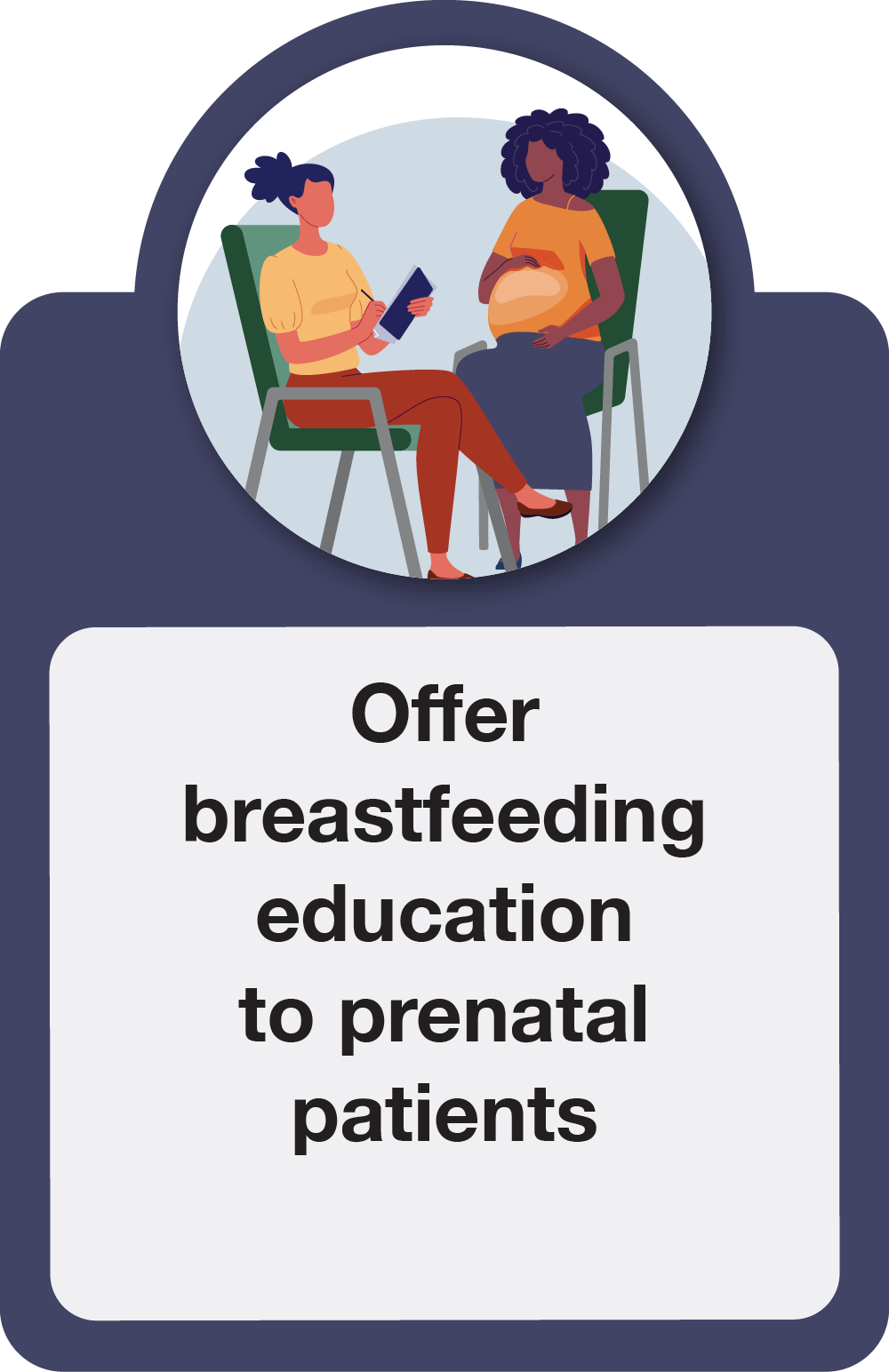
Offer Breastfeeding Education to Prenatal Patients
The decision to breastfeed usually happens many months before birth. Educate your prenatal patients on the benefits to breastfeeding for both mom and baby. This resource is packed with recommended breastfeeding education for prenatal and postpartum patients.
Research shows that fathers can also have an important role in the decision to breastfeed. Be sure to check out the breastfeeding curriculum designed for fathers: Strong Start: Dad’s Role in Supporting Breastfeeding.
If your business or clinic is interested in QR Code cards to provide to new dads, please contact info@breastfeednc.com for more information.
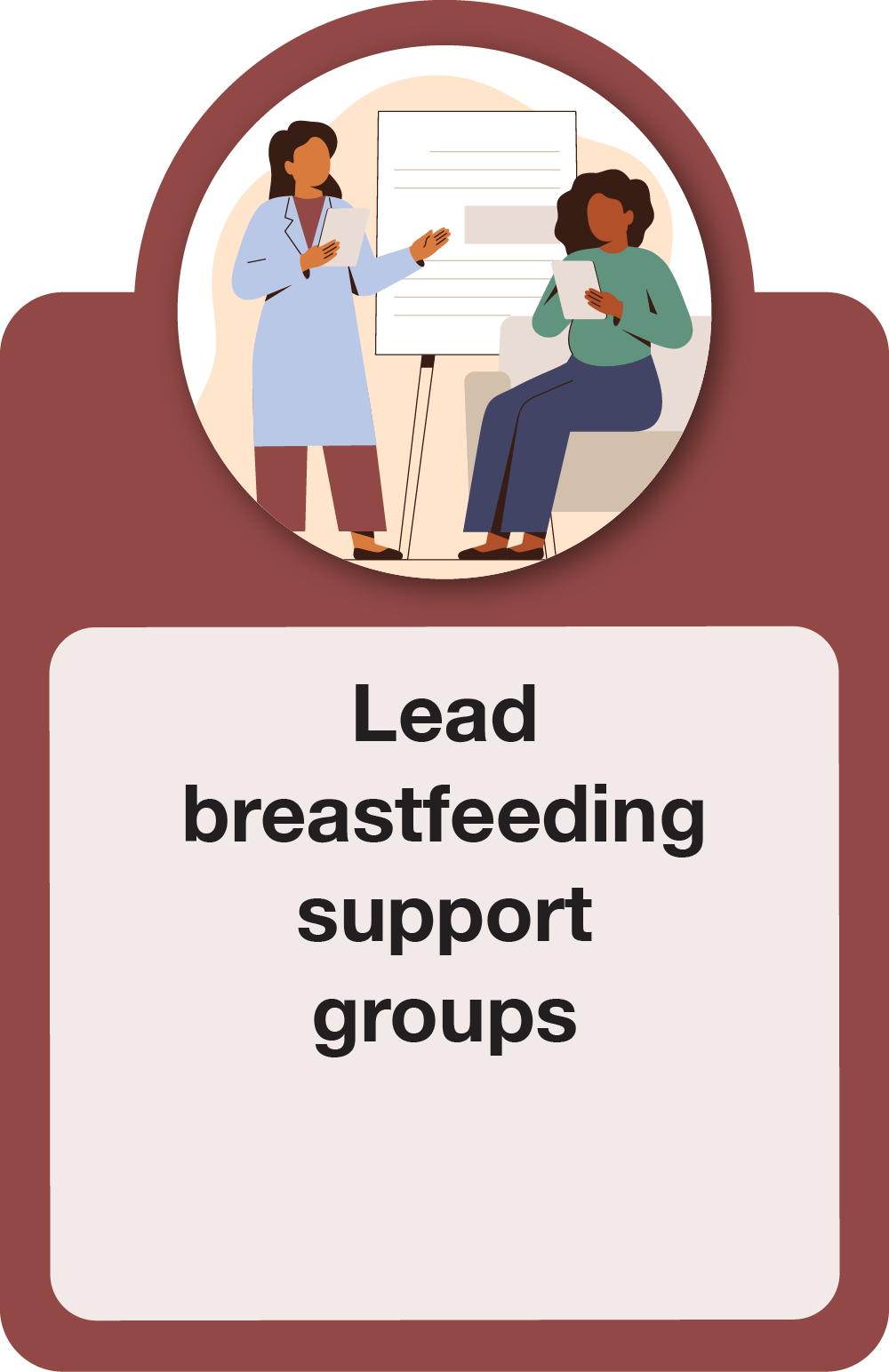
Offer Breastfeeding Support Groups
In a comprehensive breastfeeding program, mom’s will feel supported. It is also important for them to have peer to peer contact during this time. This is why offering breastfeeding support groups is so vital. These meetings will give moms a dedicated time to ask questions, get advice, and form lasting relationships.
These meetings should be led by an IBCLC or CLE and can cover a variety of topics. This resource has topic ideas and resources for both prenatal breastfeeding support groups and postpartum breastfeeding support groups.